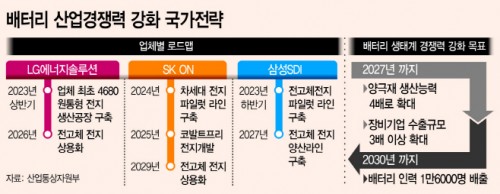 |
AsiaToday reporters Choi Won-young, Lee Wook-jae
The government and its top battery companies – Samsung, SK, and LG – plan to jointly invest 20 trillion won (US$15.1 billion) through 2030 with the aim of commercializing solid-state batteries for the first time in the world. By doing so, South Korea is expected to see the domestic production of cathode materials surge quadruple and equipment exports related to the battery field more than triple in give years. It also announced a strategy to mass-produce lithium-iron-phosphate (LFP) batteries for electric vehicles by 2025 and secure the world’s best technologies by 2027.
The solid-state battery, called the “game-changer”, is a next-generation battery that has high energy density compared to conventional lithium-ion batteries, enabling high capacity and low possibility of firing while ensuring safety.
President Yoon Suk-yeol on Thursday attended an emergency economic meeting, where the country’s strategy to enhance competitiveness of the domestic secondary battery sector was presented, and discussed ways to secure “super-gap” technologies to lead the global battery market.
Under the strategy, the three major battery makers will establish their respective “mother factory,” or a hub of cutting-edge technology tdevelopment, research, production, and other core functions at home. All the three companies plan to build prototypes of solid-state batteries in Korea.
The government plans to push for large-scale R&D to develop next-generation batteries in 2024, and will conduct research on improving safety for solid-state batteries, raising mileage of lithium-metal batteries and reducing the weight of lithium-sulfur batteries. Through this, the companies and the government plan to secure the world’s first mass-production technology for solid-state batteries for vehicles.
In order to boost domestic investment of material companies, the government decided to increase tax credit of 15 percent for large companies and 25 percent for SMEs. The government expects the domestic production capacity of cathode materials to increase by four times to 1.58 million metric tons and the country’s export of battery equipment by three times to 3.5 billion won over the next five years.
Over the next five years, the government and private sector plan to invest more than 350 billion won into developing the technologies of lithium nickel manganese cobalt oxide (NCM) batteries, lithium iron phosphate (LFP) batteries and energy storage systems (ESS). They will aim to develop NCM batteries that have a driving distance of over 800 kilometers by 2030. They will also work to secure the top-notch technology of LFP batteries and dexpand the export of ESS by five times by 2030.
“Based on collaboration between the public and private sectors, we actively responded to the US Inflation Reduction Act’s guidance. I believe it turned out to be a chance for our companies to solidify a strong position in the North American market,” Yoon said. “The government will firmly support the Korean companies in the high-tech industrial field so that they can secure a gap in dominance without being overtaken.”
#Samsung #SK #LG #battery #investment
Copyright by Asiatoday
Most Read
-
1
-
2
-
3
-
4
-
5
-
6
-
7





















